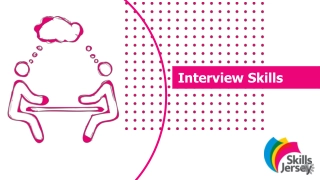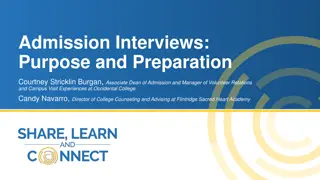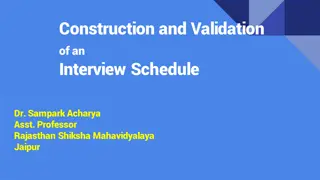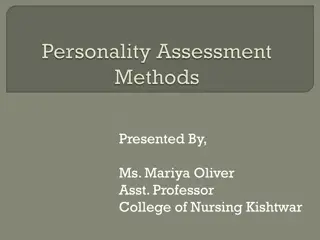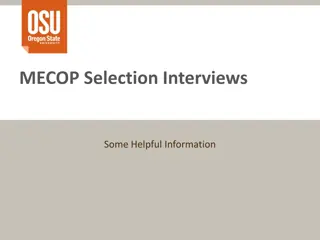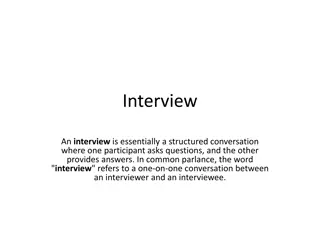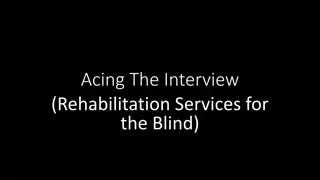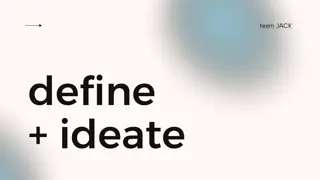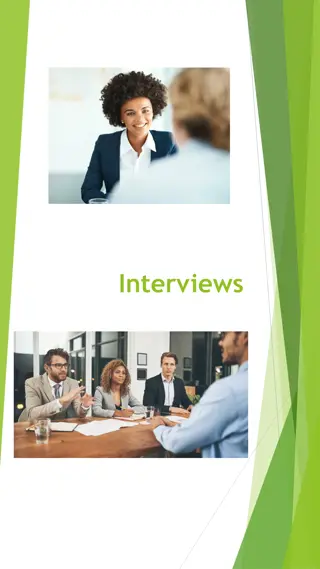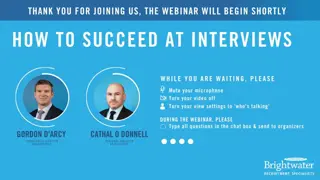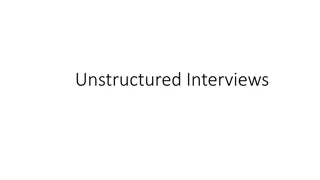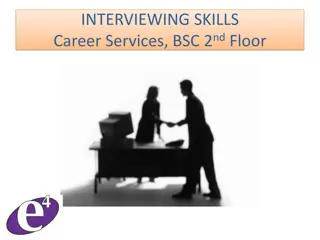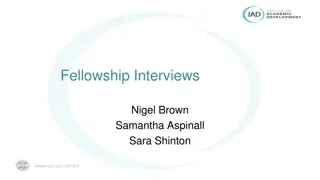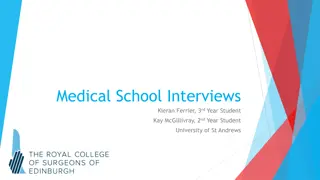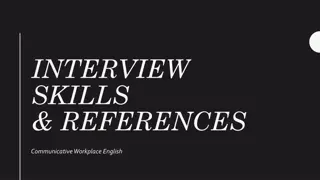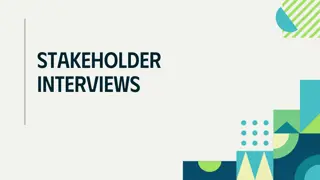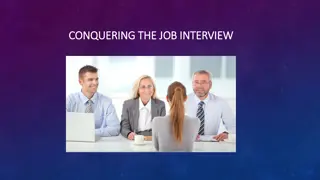Mastering Interviews: Essential Tips and Techniques
Learn how to excel in interviews with key insights on what interviews entail, competencies desired by employers, effective skills to showcase, crucial first impressions, practical exercise scenarios, evidence-providing techniques, and identifying bad answers to avoid landing the job. Elevate your interview performance starting from the first 60 seconds to delivering impactful responses using the STAR method.
Uploaded on Sep 16, 2024 | 1 Views
Download Presentation

Please find below an Image/Link to download the presentation.
The content on the website is provided AS IS for your information and personal use only. It may not be sold, licensed, or shared on other websites without obtaining consent from the author. Download presentation by click this link. If you encounter any issues during the download, it is possible that the publisher has removed the file from their server.
E N D
Presentation Transcript
What is an interview? Professional conversation Two way conversation with a purpose Opportunity for the interviewer to gain evidence Opportunity for the interviewee to obtain further information 2
What are competencies? Competencies are particular qualities that an organisation feels desirable for employers to possess During interviews and assessments competencies are used as benchmarks that assessors use to rate and evaluate candidates 3
Quick exercise to outline skills Your task In small groups consider the types of skills employers are looking for. List 5 to 10 skills. Feedback in 5 minutes 4
Competencies Teamworking Taking responsibility Understanding of the company Making decisions Communication Being trustworthy Solving problems Managing your time effectively 5
The first 60 seconds Body Language Be on time Dress appropriately Maintain eye contact Have a firm handshake Try to relax Smile 6
Exercise First Impressions Your task In pairs, take it in turns to act as the interviewer and interviewee Interviewee Your role is to approach the interviewer as if you have just met, shake their hand, and answer their question in 30 seconds Interviewer you role is to ask one question: Tell me about yourself 7
Techniques Providing evidence - S T A R Situation Set the scene Task Explain what you did Action What actions did you take Result Explain what the outcome was 8
What does a bad answer look like? Volunteer to ask an interview question Whilst I answer, jot down why you think this answer is not going to land me the job 9
Exercise - Interview practice with peers In small groups prepare answers to the sample questions and then role play as interviewer and interviewee! OBSERVER ROLE: Role: Observe the interview and provide feedback on the answer, body language, first impression etc INTERVIEWER ROLE: INTERVIEWEE ROLE: Role: Ask at least one interview question and take notes on the answer Role: Answer the interview question(s) using the STAR technique 10
Interview practice with peers OBSERVER: Role: Observe the interview and provide feedback on the answer, body language, first impression etc 1. Describe a situation where you have had to work as part of a team 2. Give an example when you have been really stretched for a deadline and how did you achieve it? INTERVIEWEE: Role: Answer the interview question(s) using the STAR technique 3. Give an example of an occasion where you have given constructive criticism to a member of your peer group INTERVIEWER: Role: Ask at least one interview question and take notes on the answer 4. Tell me what your greatest achievement to date has been? 11
Key Tips During your Interview Don t be afraid of silence. Your interviewer will be making notes It s perfect ably acceptable to take a moment to collect your thoughts Don t be afraid to ask the interviewer to repeat the question if you didn t understand it Be concise, do not provide long winded answers as this may detract from your main points Don t give one word answers. This is your opportunity to sell yourself Do not always use the words the company or we , try to explain examples and situations as I Have questions prepared in advance to ask them about the job/organisation 12
Reasons for failure Not preparing for the interview Providing superficial information or waffling Not listening to the questions - answering a question that was not asked 13


